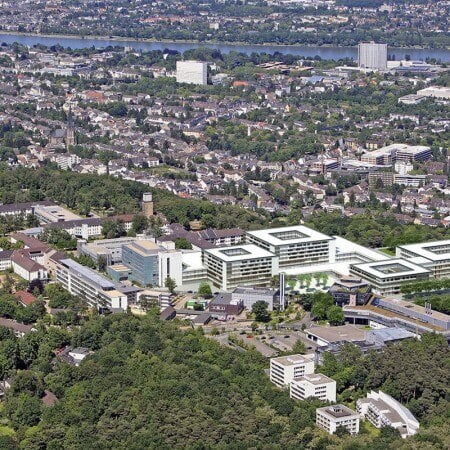A fever of unknown origin is an increase in body temperature to 38.3 degrees or more, which persists for at least three weeks if doctors have not managed to make a diagnosis (find out the cause of the increase in body temperature) within one week of the examination. More than 200 malignant, infectious, rheumatic, and other diseases can cause fever of unknown origin.
A fever itself is not treated directly, as it is a symptom but not a disease. This condition has hundreds of different causes. Doctors carry out examinations, determine the cause of the fever, and then they conduct the treatment for the underlying disease.
You can undergo your treatment in one of the following hospitals: University Hospital Essen, University Hospital of Ludwig Maximilian University of Munich, or University Hospital Duesseldorf.
The Booking Health company will organize your trip if you book your treatment abroad through our service. Our specialists will help you to apply for a visa and provide reliable medical insurance. They will also help to get to the clinic on a preferred date and translate your medical records into German. You will communicate with your doctor through an interpreter, and your personal medical coordinator will also be available for any questions.
Causes of fever
If your diagnostics in your native country were ineffective and the cause of your fever could not be found, you can go to Germany. Most patients still manage to be diagnosed and treated effectively in this country.
A huge number of causes of fever of unknown origin can be divided into several groups. These are as follows:
Infections: systemic or local. Here are some examples of systemic infections: tuberculosis, brucellosis, HIV, cat-scratch disease, Epstein-Barr virus, toxoplasmosis, or cytomegalovirus. Local infections that cause fever may include subacute bacterial endocarditis, chronic prostatitis, sinusitis, cholecystitis, lymphogranuloma venereum, or vascular graft infection.
Noninfectious inflammatory diseases: giant cell arteritis, Still's a disease, systemic lupus erythematosus, polyarteritis nodosa, rheumatoid arthritis, antiphospholipid syndrome, gout, sarcoidosis, Takayasu's arteritis, Behcet's disease, Kikuchi disease, or Felty's syndrome.
Tumors: kidney, breast, colon, pancreatic, and liver cancers, brain metastases, melanoma, lymphoma, or acute leukemia.
Other causes: include cirrhosis, pulmonary embolism, hypothalamus dysfunction, thyroiditis, intake of certain drugs, Crohn's disease, or familial Mediterranean fever.
Diagnostics of fever
Many drugs can reduce body temperature. However, they do not cure but only mask the disease, which can be deadly. Treatment without a diagnosis makes no sense.
In Germany, diagnostics begins with a clinical examination, the study of anamnesis, and general laboratory tests. Doctors clarify with the patient the issues of vaccination, heredity, information about travels, sexual life, contact with animals, injuries, operations, lifestyle, profession, etc. They set the direction for further diagnostic procedures.
During the examination, a fever model is taken into account. In some diseases, it has features, for example:
- in malaria, fever occurs every 3-4 days;
- in brucellosis, fever intensifies in the evening, disappears in the morning, and is accompanied by sweating;
- in borreliosis and Hodgkin's lymphoma, fever lasts a week, and the next week, the temperature returns to normal, but such cycles are repeated;
- Still's disease, malaria, and typhoid fever have two peaks of fever during the day.
The initial scope of diagnostic procedures usually includes:
- a complete blood count;
- a biochemical blood test;
- urinalysis with sediment microscopy and a bacteria culture;
- a blood culture;
- an inflammatory marker blood test;
- tumor marker testing;
- blood tests for infections, including HIV and cytomegalovirus;
- tuberculosis tests;
- an abdominal CT scan;
- a chest X-ray or CT scan.
Based on the results of these tests, a diagnosis can be made in some patients. Some patients have abnormalities that require clarification of the diagnosis using other methods. In this case, a person will be prescribed additional examinations. These may include:
- echocardiography may be useful for suspected culture-positive endocarditis or atrial myxoma;
- PET/CT is a highly sensitive and non-invasive diagnostic method that allows the doctors to determine the localization of infectious, inflammatory, or oncological processes;
- endoscopic examinations: colonoscopy, retrograde cholangiography, or gastroscopy;
- biopsy of the lymph node, liver, bone marrow, epididymis, and temporal artery.
Treatment
The treatment regimen depends on whether the cause of the disease is established. If this is specified, it is not the fever that is treated but the specific pathology that caused it.
If the cause is unknown, then empiric treatment of fever of unknown origin in Germany can be used. Doctors try to prescribe antibiotics, glucocorticoids, or anti-tuberculosis drugs. They assess the results and stop therapy if it does not lead to a rapid improvement in the clinical case.
Doctors in German hospitals usually manage to eliminate the cause of the fever if it is known. The prognosis depends on the severity of the primary disease.
If the cause of the temperature increase could not be determined, despite the patient's comprehensive diagnostics, the prognosis for such patients remains good. Body temperature usually drops to normal within a few weeks or months. At this time, non-steroidal anti-inflammatory drugs can be used to improve the well-being of these patients.
You are welcome to use the Booking Health service to undergo your diagnostics, treatment, and rehabilitation for a fever of unknown origin in Germany. Here you can compare the cost of treatment in different medical centers to book your treatment in the hospital at a favorable price. Our specialists will help you to select clinics in Germany and arrange your trip.
Authors:
The article was edited by medical experts, board certified doctors Dr. Vadim Zhiliuk and Dr. Sergey Pashchenko. For the treatment of the conditions referred to in the article, you must consult a doctor; the information in the article is not intended for self-medication!
Sources:
Centers for Disease Control and Prevention
NHS
The Lancet




















